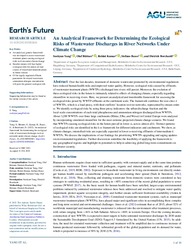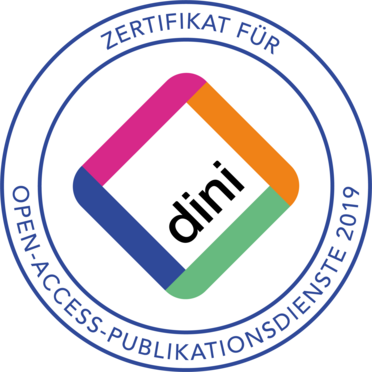An Analytical Framework for Determining the Ecological Risks of Wastewater Discharges in River Networks Under Climate Change
DOI: https://doi.org/10.1029/2021EF002601
Persistent URL: http://resolver.sub.uni-goettingen.de/purl?gldocs-11858/10386
Persistent URL: http://resolver.sub.uni-goettingen.de/purl?gldocs-11858/10386
Yang, Soohyun; Büttner, Olaf; Kumar, Rohini; Basso, Stefano; Borchardt, Dietrich, 2022: An Analytical Framework for Determining the Ecological Risks of Wastewater Discharges in River Networks Under Climate Change. In: Earth's Future, Band 10, 10, DOI: 10.1029/2021EF002601.
 |
Dokument öffnen: |
Over the last decades, treatment of domestic wastewater promoted by environmental regulations have reduced human health risks and improved water quality. However, ecological risks caused by effluents of wastewater treatment plants (WWTPs) discharged into rivers still persist. Moreover, the evolution of these ecological risks in the future is intimately related to effects of changing climate, especially regarding streamflow in receiving rivers. Here, we present an analytical and transferable framework for assessing the ecological risks posed by WWTP‐effluents at the catchment scale. The framework combines the size‐class k of WWTPs, which is a load‐proxy, with their outflows' location in river networks, represented by stream‐order ω. We identify ecological risks by using three proxy indicators: the urban discharge fraction and the local‐scale concentrations of each total phosphorous and ammonium‐nitrogen discharged from WWTPs. About 3,200 WWTPs over three large catchments (Rhine, Elbe, and Weser) in Central Europe were analyzed by incorporating simulated streamflow for the most extreme projected climate change scenario. We found that WWTPs causing ecological risks in the future prevail in lower ω, across almost all k. Distinct patterns of ecological risks are identified in the k‐ω framework for different indicators and catchments. We show, as climate changes, intensified risks are especially expected in lower ω receiving effluents of intermediate‐k WWTPs. We discuss the implications of our findings for prioritizing WWTPs upgrading and urging updates on environmental regulations. Further discussions underline the feasibility of applying the framework to any geographical regions and highlight its potentials to help in achieving global long‐term commitments on freshwater security. Key Points:
An analytical, generic framework was developed to assess wastewater treatment plants causing ecological risks in rivers under climate change.
Smaller streams will face higher ecological risks for almost all load classes of wastewater treatment plants in future climate.
Of the legally regulated effluent parameters for treated wastewater, ammonium‐nitrogen concentration will pose the greatest ecological risk.
Statistik:
ZugriffsstatistikSammlung:
- Geographie, Hydrologie [454]
Schlagworte:
analytical assessment frameworkwastewater treatment plants emissions
river stream‐order
dilution
local‐scale nutrients concentrations
This is an open access article under the terms of the Creative Commons Attribution‐NonCommercial‐NoDerivs License, which permits use and distribution in any medium, provided the original work is properly cited, the use is non‐commercial and no modifications or adaptations are made.

